Class 10 Exam > Class 10 Notes > Physics for GCSE/IGCSE > Measuring the Speed of Sound
Measuring the Speed of Sound | Physics for GCSE/IGCSE - Class 10 PDF Download
| Table of contents |

|
| Speed of Sound in Air |

|
| Speed of Sound in Materials |

|
| Measuring the Speed of Sound |

|
| Measuring Wave Speed in Water |

|
Speed of Sound in Air
- Sound waves travel at a speed of about 340 m/s in air at room temperature.
- The speed of sound in air varies from 330 to 350 m/s.
Speed of Sound in Materials
- Sound travels at varying speeds in different materials:
- Fastest in solids
- Slowest in gases
- The following table illustrates the typical speeds of sound in various substances:
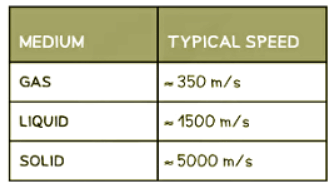
Question for Measuring the Speed of SoundTry yourself: Which substance has the fastest speed of sound?View Solution
Measuring the Speed of Sound
- Various experiments help determine the speed of sound. Below are three methods along with the apparatus for each experiment.
Method 1: Measuring Sound Between Two Points
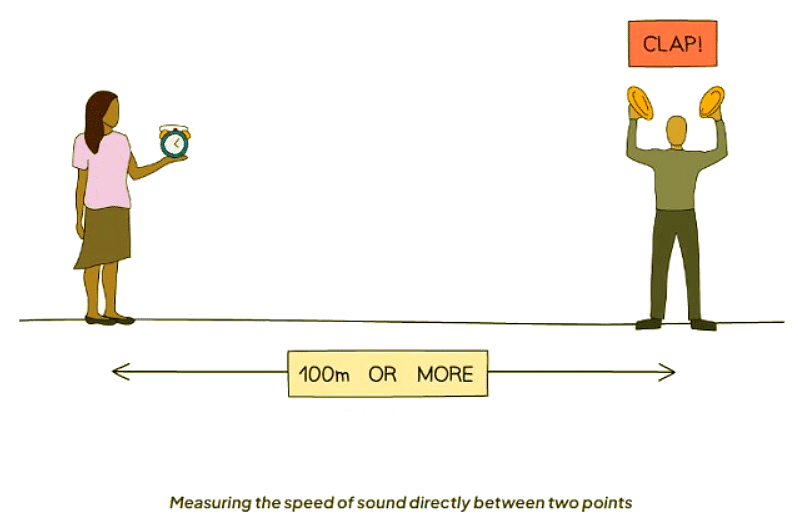
- Two individuals stand approximately 100 meters apart.
- The distance between them is measured using a trundle wheel.
- One person holds two wooden blocks, striking them above their head.
- The second person possesses a stopwatch, starting it upon seeing the blocks being struck and stopping it upon hearing the sound.
- This process is repeated multiple times to derive an average time.
- The speed of sound is then calculated using a specific equation.

Method 2: Using Echoes
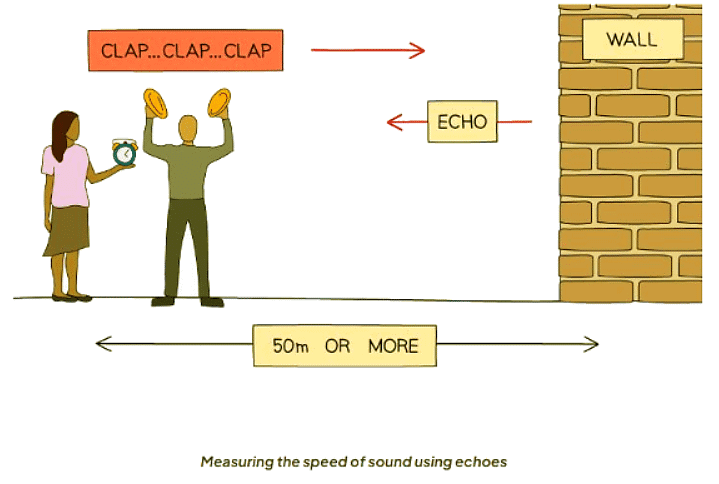
- A person stands about 50 meters away from a wall (or cliff) using a trundle wheel to measure this distance.
- The person claps two wooden blocks together and listens for the echo.
- A second person has a stopwatch and starts timing when they hear one of the claps and stops timing when they hear the echo.
- The process is then repeated 20 times, and an average time is calculated.
- The distance traveled by the sound between each clap and echo will be 100 meters.
- The speed of sound can be calculated from this distance and the time using the equation provided.

Method 3: Using an Oscilloscope
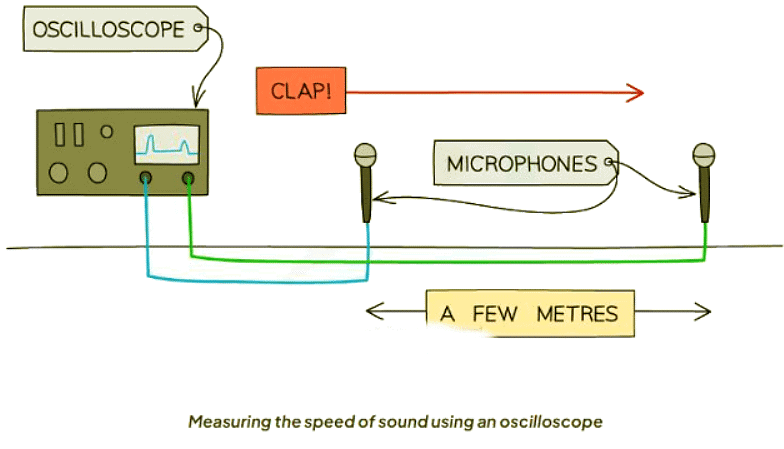
- Two microphones are connected to an oscilloscope and placed about 5 meters apart using a tape measure to measure the distance.
- The oscilloscope is set up so that it triggers when the first microphone detects a sound, and the time base is adjusted so that the sound arriving at both microphones can be seen on the screen.
- Two wooden blocks are used to make a large clap next to the first microphone.
- The oscilloscope is then used to determine the time at which the clap reaches each microphone and the time difference between them.
- This process is repeated several times, and an average time difference is calculated.
- The speed can then be calculated using the provided equation.

Measuring Wave Speed in Water
- Ripples on water surfaces serve as a model for transverse waves.
- Measurement of the speed of these water waves is achievable through this method.
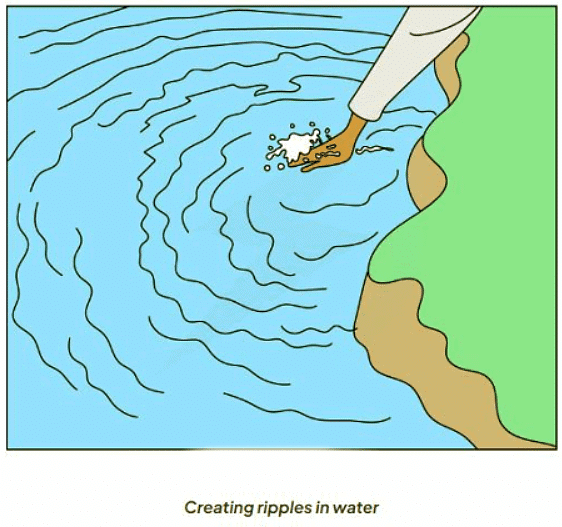
- Opt for a calm, flat water surface like a lake or a swimming pool.
- Two individuals position themselves a few meters apart, using a tape measure to determine the distance.
- One person initiates the process by creating a ripple in the water.
- The second person, equipped with a stopwatch, times the ripple's journey to them.
- Repeat the experiment 10 times to calculate an average time value.
- The average time and distance are then employed to calculate the wave speed using a specific equation.

The document Measuring the Speed of Sound | Physics for GCSE/IGCSE - Class 10 is a part of the Class 10 Course Physics for GCSE/IGCSE.
All you need of Class 10 at this link: Class 10
|
129 videos|188 docs|35 tests
|
FAQs on Measuring the Speed of Sound - Physics for GCSE/IGCSE - Class 10
| 1. What factors affect the speed of sound in air? |  |
Ans. The speed of sound in air is affected by factors such as temperature, humidity, and air pressure. In general, sound travels faster in warmer temperatures, higher humidity levels, and higher air pressure.
| 2. How does the speed of sound in materials differ from that in air? |  |
Ans. The speed of sound in materials, such as solids and liquids, is typically faster than in air due to the denser medium that allows sound waves to travel more efficiently. The speed of sound in materials also depends on factors like elasticity and density.
| 3. What are some common methods used to measure the speed of sound? |  |
Ans. Some common methods used to measure the speed of sound include the time-of-flight method, resonance method, and interferometry. These methods involve measuring the time it takes for sound waves to travel a known distance and calculating the speed based on the distance and time.
| 4. How is the speed of sound in water measured? |  |
Ans. The speed of sound in water is typically measured using hydrophones, which are underwater microphones that can detect sound waves. By measuring the time it takes for sound waves to travel through water over a known distance, the speed of sound in water can be calculated.
| 5. How can students in Year 11 conduct experiments to measure the speed of sound? |  |
Ans. Students in Year 11 can conduct experiments to measure the speed of sound by using simple materials like rulers, tuning forks, and stopwatches. By creating controlled environments and measuring the time it takes for sound waves to travel through different mediums, students can calculate the speed of sound and explore factors that affect it.
Related Searches



















